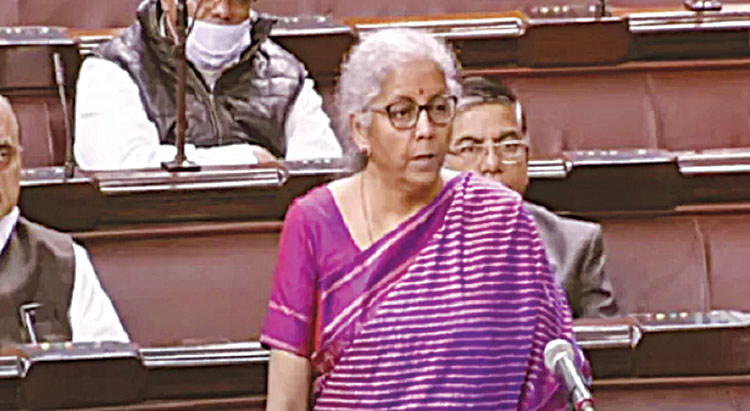New Delhi, Feb 11 (FN Agency) Stating that government’s focus on growth and capex had helped the country during pandemic, Finance Minister Nirmala Sitharaman on Friday said that India is today the fastest growing economy among large economies of the world. Responding to general discussion on Budget in Rajya Sabha, the Finance Minister defended the supply-side interventions of the government and noted that advanced economies which had gone for big stimulus to boost demand are now facing high levels of inflation. She said that US inflation has hit 40-year high and Germany is facing the kind of inflation it had not seen since 1992.
“Inflation management and carefully allotting your resources is also very important for responsible jobs of finance ministries all over the world. I want to highlight WPI (wholesale) inflation is no longer the benchmark metric for measuring inflation….. WPI doesn’t influence inflation metric. CPI (retail inflation) is what we have to look at and CPI is that index that RBI also looks at when it is monitoring inflation control measures,” Sitharaman said. She further said that since 2014, Prime Minister Narendra has ensured that we keep our inflation well contained. “Highest inflation or worst ever inflation if ever in this country endured is 2010-14 when retail inflation was more than 9 per cent in 22 out of the 28 months from January 2012 to April 2014 inflation was well over 9 per cent,” she said taking on the Opposition. Sitharaman said that the Budget 2022-23 is a budget of continuity, stability and predictability in taxation, and had presented the vision for India in next 25 years (referring it as Amrit Kal).
“India’s GDP is projected to grow at 9.2 per cent to Rs 147.5 lakh crore for the current financial year ending March 2022 which will be the highest among all large economies. There is no question of a slowdown or a recession,” the Minister said. Speaking on infrastructure building, Sitharaman said that the PM Gati Shakti is aimed at integrated infrastructure development in the country instead of standalone, isolated facilities created earlier. “We needed to bring greater synergy, greater complementarities between various infrastructure spending that we are undertaking… It’s not to say that infrastructure spending has never happened in this country. It has happened but what we find that over decades that each projects by itself in standalone nature has not given the kind of multiplier that such investment should have given,” the Minister said. On the support to MSME sector, Sitharaman said that several schemes have been brought in to help the sector.
“For MSMEs, several schemes have been brought out that is because during Covid we needed to give them support. ..Rs 20,000 crore subordinate debt (scheme), Rs 3 lakh crore collateral free loan for businesses including MSMEs which was advanced to Rs 4.5 lakh crore and now during the budget we have given Rs 50,000 crore more raising it to Rs 5 lakh crore. Rs 50,000 crore equity infusion through MSME self-reliant India fund. From this (scheme), money has been disbursed and people have benefitted,” the Finance Minister said. On some members pointing out that a study had shown 67 per cent MSMEs were shut during pandemic, the Minister said that they were only temporarily shut. “Quoting a study which is made available in the public domain it was mentioned that based on study in 2020-21, it was mentioned that 67 per cent of MSMEs were shut. But what they have failed to say from very such study is…the very same study said 67 per cent of MSMEs were temporarily shut. I have gone through the study.
I will quote the study, that very study says they were temporarily shut, if the lockdown is in place won’t they shut? Use the word appropriately, it was temporary,” Sitharaman said. “Because ECLGS was extended many of them have taken a credit facility which was given, as a result, they are staying afloat even today. The SBI study shows that how many people have benefitted from ECLGS. According to the study, 65% of MSME surveyed availed benefits of government’s emergency credit guarantee scheme which provided banks and financial institutions 100 per cent guarantee against any loss incurred by them on repayment of these …so let us understand,” Sitharaman said.
On members raising the issue of lower allocation under flagship scheme MNREGA, the Minister said that Rs 73,000 crore has been provided for FY23 and since the scheme is demand-driven more funds would be provided through Supplementary Demands of the Budget as and when necessary. She noted that the government had born the high global price of fertiliser and ensured that increased prices are not shifted to farmers. Responding to questions over unemployment, the Minister said that latest periodic labour force survey indicates that urban unemployment rate in January-March quarter of 2021-22 has declined to pre-pandemic level of 9% after peaking at 20.8 per cent of unemployment. She also said that November 2021 saw a net addition in the EPFO subscription to 13.9 lakh new subscribers, an increase of 109.21 per cent year-on-year.

